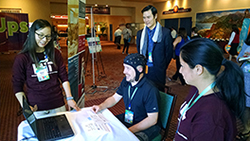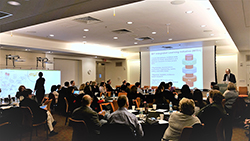
| Vol.
XXIX No.
3 January / February 2017 |
| contents |
| Printable Version |
MIT Integrated Learning Initiative
Celebrates One-Year Anniversary
In February of 2016, as reported by MIT News, MIT President Rafael Reif announced the creation of the MIT Integrated Learning Initiative (MITili, pronounced “mightily”) to “combine research in cognitive psychology, neuroscience, economics, engineering, public policy, and other fields to investigate what methods and approaches to education work best for different people and subjects.”
Over the course of its first year, MITili’s accomplishments include the following:
- President Reif’s February 2016 announcement and a subsequent MITili announcement in May included our appointments as MITili Director (Gabrieli: Brain and Cognitive Sciences) and Associate Director (Pathak: Economics). The diversity of our work underscores the interdisciplinary breadth of MITili’s focus, investigating PK-12, higher education, and workplace/lifelong learners ranging from networks of neurons via fMRI, EEG, and MEG in a single brain to hundreds, thousands, or even millions of learners via randomized control trials at a city, state, MOOC, or national level.
- In May of 2016, MITili convened a retreat at MIT’s Endicott House in Dedham, MA. Faculty members Sanjay Sarma (Vice President of Open Learning), Joshua Angrist (Economics), Angela Belcher (Biological Engineering), Isaac Chuang (EECS/Physics), David Pritchard (Physics), Mitch Resnick (Media Lab), and Matt Wilson (Brain and Cognitive Sciences), plus key Office of Digital Learning (ODL) staff joined us to brainstorm generally on paths forward for MITili and to tackle specific issues including the differences in brain development before PK-12 students are able to read, the learner's socioeconomic status, and educational policy.
- August 2016 saw the hiring of MITili’s first two staff members: Associate Director Jeff Dieffenbach and Program Coordinator Steve Nelson. Jeff and Steve work closely with MITili-associated faculty and ODL staff to raise corporate, foundation, and other funding to support learning effectiveness research; support on-campus faculty interactions; and assist in the internal and external dissemination of research-supported best practices.
- In September of 2016, MITili created its framework for a learning effectiveness consortium. The consortium, drawing on those of CSAIL, the Energy Initiative, the Initiative on the Digital Economy, and the Media Lab, brings together companies and others to fund and participate in transformational research on academic and workplace learning effectiveness.
- In October of 2016, Professor Sarma delivered a keynote at the Elliott Masie Learning conference in Orlando. MITili and ODL staff supported separate sessions by Professor Sarma and Brain and Cognitive Sciences post-doctoral student Kana Okano. Dr. Okano’s session reported findings from work with a leading consulting firm – MITili’s first research project – on capturing and measuring attention in a video-based workplace learning environment.
- MIT’s McGovern Institute hosted a November 2016 gathering of 50 Chief Learning Officers and their designees from 30 companies, government agencies, and universities, including AIG, Babson, Fidelity, GE, Google, IBM, McKinsey, Office of Personnel Management, and Pepperdine. The meeting, part of a three-day event co-run by Future Workplace, shared MIT’s thinking on learning and heard from the participants about how they create and deliver learning experiences, about how they measure those learning experiences, and about the biggest learning challenges they face.
- November 2016 also kicked off MITili’s series of faculty conversations on transformational learning effectiveness research. Professor Gabrieli briefed the group on a research effort aimed at improving the ability of all students to be reading and doing math proficiently by the end of third grade. In December, Professor Pathak shared ideas on a universal enrollment system designed to provide access to quality education for all students and families. Professor Laura Schulz (Brain and Cognitive Science) led the February talk on early childhood cognition.
Across its learning research, MIT’s mens et manus motto – mind and hand – guides MITili’s approach to learning research. Researchers develop theories, rigorously test them in the lab, then work to see them through to implementation in the field. With 2017 underway, MITili is excited to continue its mission to promote, support, and disseminate transformational Institute research investigating learning effectiveness.
| Back to top | |
| Send your comments |
| home this issue archives editorial board contact us faculty website |

